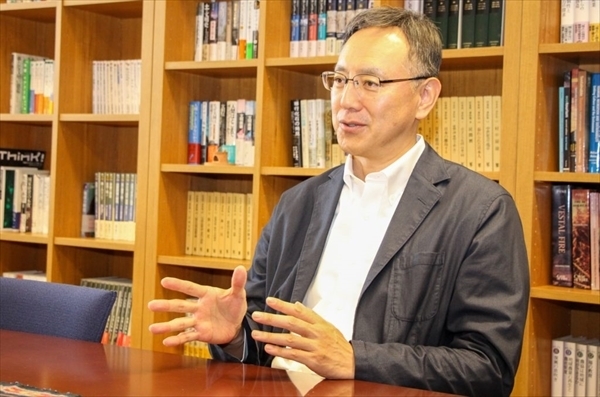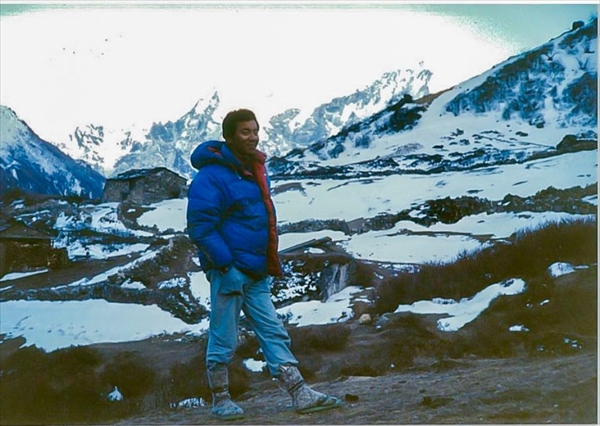365体育备用网址_365体育博彩-直播|官网
AIU Voices
【Faculty Voices】 Episode 1: “Climb Ev’ry Mountain” – Dr. Yoshitaka KUMAGAI
You may have seen the faces of our faculty members, be it in a face-to-face classroom, an online classroom discussion, the university brochure, or possibly, through their professional outputs. But do you know how they really are as an individual?
This Faculty Voices series aims to acquaint you with some of our unique faculty members in the form of a relay essay by the faculty themselves. You will have a chance to get a glimpse of the faculties’ personal agenda, concept on life, philosophy, and memories, as well as their area of profession and research theme.
The first episode is from Dr. Yoshitaka Kumagai, the vice president of AIU.
Dr. Kumagai has assumed office as the vice president of AIU on August, 2019. He obtained his Ph.D. at Oregon State University in the United States, and has been teaching at AIU since its establishment in 2004. Dr. Kumagai specializes in nature reserves environmental policies and has been the vice-chairperson of the International Union for Conservation of Nature and Natural Resources (IUCN), World Commission on Protected Areas, and the chairman of IUCN Japan Committee. He has also chaired countless council committees in Akita Prefecture, Japan.
As the first message in the series, he offered us a message under the theme of “Thus I overcame my frustrations/setbacks.”

Climb Ev’ry Mountain
Dropout
In the early summer of my junior year at a university in Tokyo, I completely lost sight of the meaning of studying and university life, so I left the hot and humid Tokyo and started working in a mountain lodge in the Central Alps of Nagano Prefecture. Initially, it was only supposed to be a summer part-time job, but I became so fascinated by the natural environment and majestic mountains that I ended up working there until November.
I then went on a self-seeking trip alone to Kyushu and Yaeyama Islands in Okinawa, and dropped out of university. The following year, I started working at a mountain lodge in Chubu Sangaku National Park (commonly known as the North Alps), where I indulged in mountain climbing and a carefree lifestyle. As my job, I fully enjoyed cooking meals for climbers, securing water, cleaning rooms, maintaining trails, and rescuing people in distress. I also enjoyed reading lots of serious and heavy books under my personal lamp late into the night at the lodge. At the same time however, I was anxious about my future, having dropped out of university and losing sight of my educational and future goals.
I often asked myself, “What am I doing?”
I had a sense of defeat and feelings of frustration when I would think about my future. Moreover, I felt apologetic for failing my parents, and felt extremely impatient with myself when I saw from a distance that my friends were living successfully in society.
Turning point
After working in the mountain lodge for two years, my mountain colleagues and I went to Nepal and India. It was my first overseas trip, and two life changing events happened during that four-month long journey.
The first was witnessing the starry sky from the Himalayan Mountains. I was overwhelmed by the frightening sight of countless stars and meteors flying in the sky, and at the same time, I was stunned by the smallness of my existence and sense of frustration I was experiencing. Something broke inside of me and a drive to step up and create a change in my life overcame me.
The second life changing event was witnessing the Hindu holy site of Varanasi, a town on the Ganges River, where I witnessed the incineration of human bodies. On the banks of the Ganges River, there is a corpse-burning space with a pyre where bodies wrapped in white cloth are brought in one after another and burned. After the burning of a body, workers would scatter the ashes into the Ganges River, which is a sacred river to Hindus. This experience to me was a reflection of the fact that life is constantly flowing, and that life and death is cyclical.
Through these two experiences, I was able to understand the miniscule significance of existence of a person in the universe, and the questions I should ask myself if I am going to die one day is, “What should I do with my life?” and “What is my mission in life?” The answer I came up with was, “I want to contribute to society by studying sustainable management and the conservation of nature,” in order to support human society and the natural environment from the foundational level. From this self-introspection of living three years in a mountain lodge and climbing the Himalayas, a new path was found and a determination to redo my studies was born.
Left: Against the background of Machapuchare/ Right: Against the background of Hodaka Mountains
In my late twenties, I thereafter studied at the University of Montana’s School of Forestry in order to study the aforementioned topic, and after earning my doctorate at Oregon State University’s School of Forestry, and holding a research associate position at Washington State University, I joined AIU in 2004.
Incidentally, the anxious feelings I experienced when I was working in the lodge for two years ended up being closely connected to my research theme afterwards, and that the frustration I experienced at the time (as a result!), I believe, were not a waste of time.
Looking back on it now, I think I took a really long detour in my youth. I can’t imagine what my life would have been like if I hadn’t had those two life changing experiences during my eye-opening trip to Nepal and India. The thing I can say with confidence however, is that no matter what the situation, I didn’t give up, I spent all my time reading and struggling to move forward, and I think that was the basis of my subsequent actions and decisions.
I’m sure there will be times in the future when you will feel anxious and frustrated, but I hope that you will never give up on yourself and will keep moving forward. In addition, ask yourself what you think you should do in the future, both in the international community and in your home country. I believe that by taking a bird’s-eye view of the world and asking yourself what you should do will help you to discover your infinite potential.
Click here to learn more about AIU faculty.


